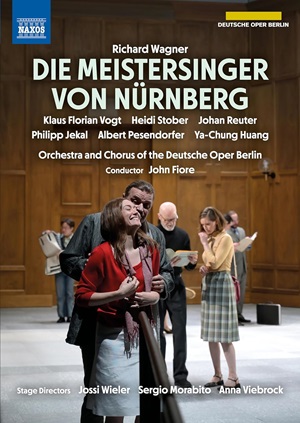
Richard Wagner (1813-1883)
Die Meistersinger von Nürnberg (1868), Opera in Three Acts
Libretto by the composer
Walther von Stolzing – Klaus Florian Vogt (tenor)
Eva – Heidi Stober (soprano)
Hans Sachs – Johan Reuter (bass-baritone)
Sixtus Beckmesser – Philipp Jekal (baritone)
Veit Pogner – Albert Pesendorfer (bass)
David – Ya-Chung Huang (tenor)
Magdalena – Annika Schlicht (mezzo-soprano)
Chorus and Orchestra of the Deutsche Oper Berlin / John Fiore
Jossi Wieler, Sergio Morabito, Anne Viebrock, stage directors
rec. live, 2022, Deutsche Oper, Berlin, Germany
Reviewed in stereo
Naxos 2.110766-67 DVD [2 Discs: 281]
It took three stage directors to produce this travesty of Wagner’s colourful and wonderful opera! The production bears little resemblance to the real thing. I do not know why opera producers these days think they have to update and totally change what the composers intended. I mentioned this in my review of Barrie Kosky’s Vienna State Opera production of Janáček’s Káťa Kabanová which in all other respects is terrific (review). This Meistersinger, however, is not redeemed by some good performances. Simon Thompson in his review finds more to like than I do, but that has largely to do with the performances than with the production (review).
What is given here instead of a sixteenth-century guild setting in Nuremberg is Dr. Pogner’s modern and drab music conservatory that even possesses some Nazi symbolism from the 1930s. The song contest has the professors as mastersingers and the students as apprentices, with Pogner giving the hand of his daughter, Eva, and his successor as director of the conservatory to the winner of the contest. Hans Sachs here has the double role of percussion instructor and foot therapist, as well as marketer of Crocs—the only seeming allusion to the cobbler of Wagner’s original. The students also don Crocs throughout the production. Johan Reuter in good voice positively impressed me as Sachs, as did also Heidi Stober as Eva. Klaus Florian Vogt is a bit past his prime, but is convincing in the role of Walther. I really enjoyed his Prize Song, which rarely fails to move. Philip Jekal is typically repugnant as Beckmesser, but it makes no sense for him to accompany himself on the piano while the orchestra is performing on the lute that is in the score. And so it goes. The rest of the cast are more than satisfactory. The orchestra and chorus do not disappoint, and John Fiore holds it all together very well. Sound and picture are fine on the DVDs, without any distortion of the kind that Simon Thompson noticed in the surround sound of the Blu-rays he reviewed.
Personally, I see no reason to acquire this set when there are better options available. Purely as audio, I would turn either to Solti and the Chicago Symphony on Decca or Jochum on DG, the latter with Fischer-Dieskau as an unforgettable Hans Sachs. There are a number of excellent productions on video, too, from which to choose.
Leslie Wright
Buying this recording via a link below generates revenue for MWI and helps us keep free access to the site




















